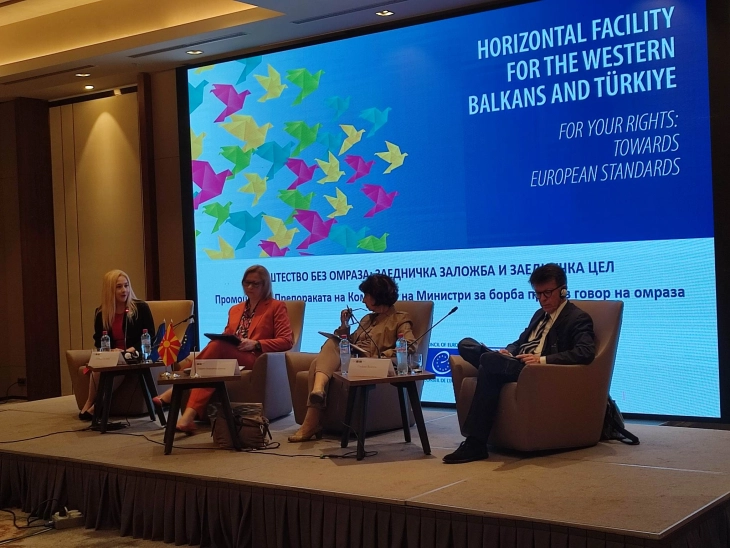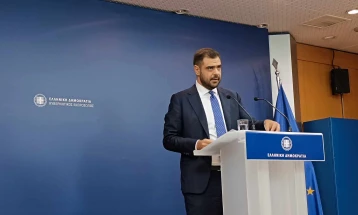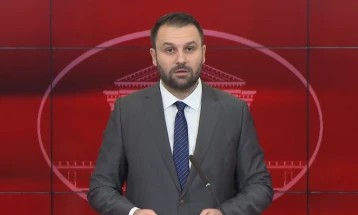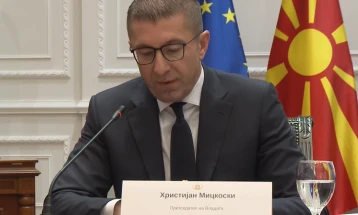Strengthening legislation and personal responsibility key to tackling hate speech
- Strengthened legislation, personal responsibility, being informed, practical application and adequate financial resources are part of the challenges in combating hate speech that were discussed at Wednesday's conference "Society Without Hate: A Common Commitment and Purpose" where the recommendation to the Committee of Ministers on combating hate speech was promoted.
- Post By Ivan Kolekevski
- 16:59, 31 May, 2023

Skopje, 31 May 2023 (MIA) - Strengthened legislation, personal responsibility, being informed, practical application and adequate financial resources are part of the challenges in combating hate speech that were discussed at Wednesday's conference "Society Without Hate: A Common Commitment and Purpose" where the recommendation to the Committee of Ministers on combating hate speech was promoted.
Deputy PM for Good Governance Policies, Slavica Grkovska, said that the safe distance from which comments, opinions, information, and discussions are being made, especially the ability to have anonymous public discourse, destroys the basic decency in people's relationship. According to her, this opens the doors for spreading hate which tears apart the social fabric, and destroys trust and solidarity in society, while emphasizing personal responsibility, especially of those who have any influence that use and strengthen it by spreading hate.
"Such behavior and rhetoric of politicians and public figures are catalysts for the negative charge in society. When, for example, you have a situation with an MP who sends a message calling for violence from their platform that is not just cheap populism for collecting points, but an open call to commit hate crime. When we normalize hate speech on such level, we cannot expect it to have a different effect in society," noted Grkovska and added that dealing with it must be continuous and all parties must be involved, by incorporating international practices and experiences.
She said the European Council and European Union have been taking these issues seriously for years, and are helping our institutions and civil sector in their efforts to improve legal regulation, monitor and analyze hate speech in North Macedonia.
"This event is part of those efforts, and I believe that the Committee of Ministers' Recommendations for combating hate speech, which we now have in Macedonian as well, will encourage all affected parties to fully dedicate themselves to taking measures for their implementation," Grkovska said.
MP Gordana Siljanovska-Davkova believes that people need to be informed en masse, because uninformed people oftentimes "choose the wrong words", as well as a legal framework that will be all encompassing, efficient, and very careful.
"We must never forget about freedom of thought and the free expression of thought. We must not forget it is not only Article 10 of the Convention, but that it is the foundation of the largest number of other freedoms, without it democracy cannot be," added Siljanovska-Davkova.
Alessandro Albu from the EU Delegation in Skopje said a society that is competitive, peaceful, and reacts to society's needs is a society that protects human rights, and singles out gender identity, sexual orientation, political issues as the basis of discrimination.
"These challenges must be solved holistically, with adequate financial resources. Proactive approach and taking responsibility are also important, not just during this project but in other activities afterwards," Albu added.
Stefano Valenti, Head of “No Hate Speech and Co-operation” Unit at the Directorate General of Democracy within the Council of Europe, spoke about the Recommendation, stating it is notable that there is a delicate balance in North Macedonia between the different minority groups. Though, he believes that this recommendation must enter into practical application of both the courts and governments, and that criminal law should be the last resort that should be applied in the case of hate speech.
"The recommendation is not case law, it provides guidelines for independent monitoring bodies as the European Commission, and was adopted by 46 member countries of the European Council. North Macedonia's Government adopted it, and brought it on as their own document. It is a matter of a soft law that will become a legal framework within the case law," Valenti stated.
The aim of the conference is to encourage dialogue between entities for combating hate speech, as well as facilitate discussions on initiatives taken in accordance with the Recommendation, and the proposals for possible activities that would go into its implementation.
The recommendation of the Committee of Ministers for combating hate speech was adopted in March 2022 in Turin. Among other things, it calls on governments of the member states to develop comprehensive strategies to prevent and combat hate speech, by securing an effective legal framework and implementing carefully calibrated and proportional measures.







